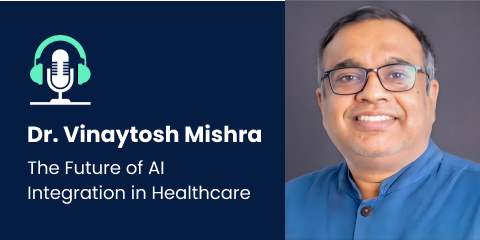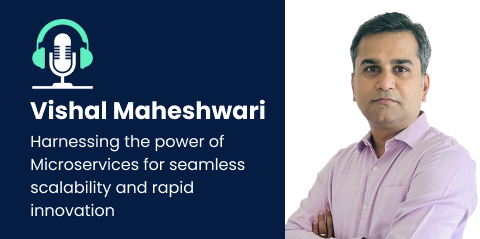Podcast Insights:
A. What is fueling the transformation is the availability of data. Digital tools such as apps, AI, wearables MIoTs, diagnostic devices are generating unprecedented amounts of data. We are working on the data to personalize health care , to research to be more predictive. We have seen a push towards such change as it gives a motive to monitor the people at home , vitals of people, and also what people can report thor symptoms, without coming to the clinic, thus data in a structured way is helping all this change. Patients can self – monitor, and participate in ,a dynamic approach to patients, they become part of the care, they can report, monitor and express themselves. Data is the backbone of the transformation that we are seeing today.
A. Companies who have experience with managing data will have the edge. COmpanies like APple and Google have jumped into healthcare. Though there is a need to partner with the HC companies to help with contact tracing and other diagnosis.
Here the government’s stance is critical as they have to decide if they would allow these players to collect data. Regulations and data privacy policy are key in shaping the future of digital healthcare. Also, the other aspect about the incentivization of healthcare organizations. Reimbursement regulations are the key, in germany prescribable apps would be available, and the clinicians would be able to prescribe applications that would be eligible for reimbursement. However its first regulation which is very encouraging, but HC tech providers are also providing apps that are directed to clinicians would not be able to benefit from it, as they are patient facing. Yes, it is forward, but more change is needed to rope in AI and other tech. As it would add specificity to the direction of widespread adoption at national level, something that would become the norm.
A. The constraint of insurance companies who do not allow to switch between providers would hold the exigency of the focus on patient experience. But for those who can switch, yes it would be important. Like in countries like Germany, and Switzerland where you can pay additional for extra options to choose what you want to do and in such cases patient exp is vital.
But without choice it would take time, and we need a mindset change to allow the competition on grounds of personalization, option, tele monitoring, telehealth, and enabling consults from home, and there were cases during pandmeic, many clinic who did not have gone ofrit.
But regulations as they flip back, clinics may not offer, as reimbursements no longer valid. So there is a need for mindset change, as only willingness of patients is not enough, they are ready.
A. As digital involves data, and allows constant monitoring, it certainly puts the focus on outcomes as it makes it easier to measure success and results as it enables better transparency, measurement, and monitoring, tracking . And is enabling the shift from medical care to health care.
THe present focus is on cure, fixing the issue and the ailment. In very few cases do we see a holistic approach, a multidisciplinary approach , especially with people with chronic diseases are autoimmune diseases. complexity needs monitoring and interconnectivity otherwise if tis just separate specialists trying to fix it will not help. DIgital has a lot of scope to move from patient care to health care.
A. In many cases yes, personalization is certainly helpful and digital has capabilities to deliver it. For instance- Cancer drugs need to be adjusted to the changes patients are facing – weight gain or loss. DOse adjustment is helpful , with digital you have a lot of opp, as you can monitor the patients in between visits. I know a doctor in France who monitors lung cancer patients with AI enabled algorithms with which he was able to prolong life by eight months with AI and digital.
It need not be advanced technology, but a simple monitoring with digital tools can go a long way in imprint Healthcare delivery.
Hyperpersonal Oztion for rare diseases is also an area where tech is delivering better outcomes
A. In terms of user experience, the patients have been delighted with the results of telemedicine, and many clinics who have never used telemedicine were able to use and treat patients with great satisfaction.
For things like routine checks and annual visits where you need not necessarily be in the hospital. With the rise of wearable and diagnostic a lot can change.
But then a lot depends on the regulations. If they do not reimburse, innovation will get thwarted.
A. They should first speak to their customers. A lot of startups I have seen have great technology, but they have not spoken to the patients and that can change everything.
The companies need to talk to the users at an early stage to know what they want to develop the right product. User feedback will help in finding where the problem lies, sometimes if it is the colour, or the font size, which confuses them and they drop out.
Also when making a tool for clinicians, one must be careful to ensure that it fits into their workflow and is not an additional task. They would not use something that adds to their effort. Look into infrastructure, these systems need to speak with each other.
Digital tools or platforms have a lot of value to add with process automation, so that all the additional work for clinicians can be taken care of.
Understanding the user’s needs is critical. Making the application easy to use and effective is important. Empathetic approach is needed, for instance, for cancer and chronic illness patients their condition may not allow them to use the app. You have to really fit into the lives of the patients and cater to their very specific needs. such considerations are vital and must be considered in designing the application.
Recent Podcasts
Duration: 43 minutes
Jay H. Sanders, M.D., CEO 0f The Global Telemedicine Group, discussed the decisive rise of telemedicine and future of healthcare.
Play EpisodeDuration: 20 minutes 29 seconds
Dr. Vinaytosh Mishra is the Director of Thumbay Institute for AI in Healthcare and Associate Professor for Healthcare Management (Management,...
Play EpisodeDuration: 23 minutes 04 seconds
Vishal Maheshwari is a Senior Cloud Architect at Techment with over 16 years of extensive development, design, and management experience...
Play Episode

